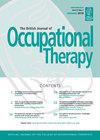Bringing therapy home: Exploring parents’ experiences of telehealth for children with developmental coordination disorder
IF 1.3
4区 医学
Q3 REHABILITATION
引用次数: 0
Abstract
Introduction: Developmental coordination disorder (DCD) significantly impacts a child’s motor skills and ability to learn and perform self-care and academic tasks. Telehealth is a rapidly emerging service delivery model, ensuring expanded access to services and continuity of care. Many benefits to the use of telehealth have been identified; yet, there is a dearth of published evidence available on the experiences of parents of children with DCD. Aim: The aim of this study was to explore parents’ experiences of implementing a telehealth motor skills programme for their child with DCD. Method: This study utilised a qualitative descriptive approach to best capture parents’ experiences of a telehealth programme. Data were collected through in-depth, semi-structured interviews with eight participants and analysed using thematic analysis. Measures to ensure the trustworthiness of the study were observed within the naturalistic paradigm comprising criteria of credibility, transferability, dependability and confirmability. Findings: This study uncovered three major themes: (1) Parents in the dark, (2) telehealth in the family and (3) telehealth: what success looks like. Ten further subthemes highlighted the factors for success and parents’ considerations for future service delivery. Conclusion: Challenges for parents in accessing traditional occupational therapy services present an opportunity to explore alternative means of delivery such as telehealth. Parents, however, are clear in their preference for a blended approach for future services.将治疗带回家:探索父母对发育协调障碍儿童的远程健康体验
引言:发育协调障碍(DCD)严重影响儿童的运动技能以及学习和执行自我照顾和学业任务的能力。远程医疗是一种迅速兴起的服务提供模式,可确保获得服务的机会和护理的连续性。已经确定了使用远程医疗的许多好处;然而,关于DCD儿童父母的经历,目前还缺乏公开的证据。目的:本研究的目的是探索父母为患有DCD的孩子实施远程健康运动技能计划的经验。方法:本研究采用定性描述性方法来最好地捕捉父母对远程医疗计划的体验。数据是通过对八名参与者进行深入的半结构化访谈收集的,并使用主题分析进行分析。确保研究可信度的措施是在自然主义范式中观察到的,该范式包括可信度、可转移性、可靠性和可确认性标准。研究结果:这项研究揭示了三个主要主题:(1)黑暗中的父母,(2)家庭中的远程医疗,以及(3)远程医疗:成功的样子。另外十个分主题强调了成功的因素以及家长对未来服务提供的考虑。结论:父母在获得传统职业治疗服务方面面临的挑战为探索远程医疗等替代分娩方式提供了机会。然而,家长们明确表示,他们更喜欢未来服务的混合方式。
本文章由计算机程序翻译,如有差异,请以英文原文为准。
求助全文
约1分钟内获得全文
求助全文
来源期刊

British Journal of Occupational Therapy
REHABILITATION-
CiteScore
2.20
自引率
15.40%
发文量
81
审稿时长
6-12 weeks
期刊介绍:
British Journal of Occupational Therapy (BJOT) is the official journal of the Royal College of Occupational Therapists. Its purpose is to publish articles with international relevance that advance knowledge in research, practice, education, and management in occupational therapy. It is a monthly peer reviewed publication that disseminates evidence on the effectiveness, benefit, and value of occupational therapy so that occupational therapists, service users, and key stakeholders can make informed decisions. BJOT publishes research articles, reviews, practice analyses, opinion pieces, editorials, letters to the editor and book reviews. It also regularly publishes special issues on topics relevant to occupational therapy.
 求助内容:
求助内容: 应助结果提醒方式:
应助结果提醒方式:


